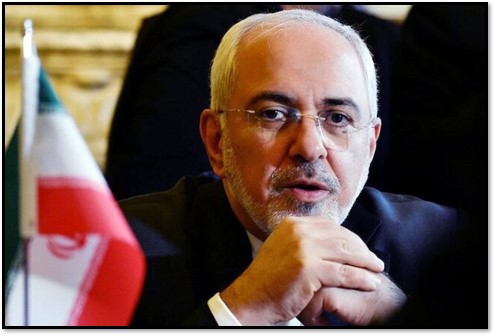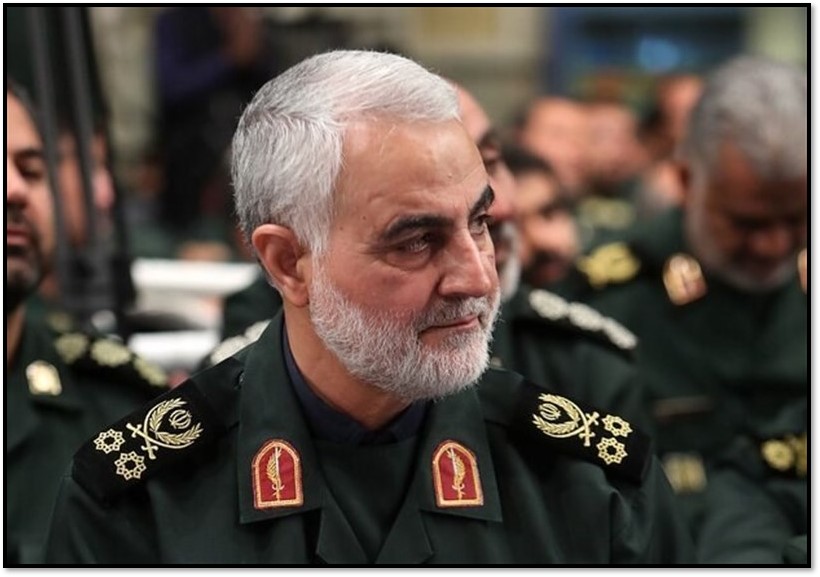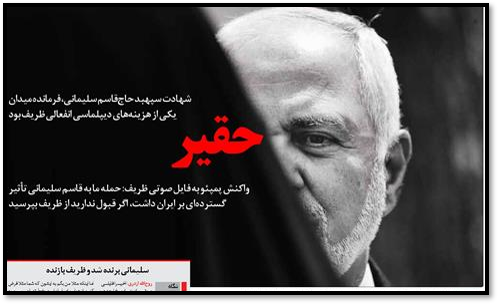
On April 25, Iran International TV, a Persian-language station based in London, aired three hours of a leaked interview with Foreign Minister Mohammad Javad Zarif that triggered a political firestorm. Zarif candidly said that the Islamic Revolutionary Guard Corps (IRGC) dominated foreign policy, had withheld information about military operations, and had sidelined the foreign ministry in major decisions. The interview revealed the depth of the power struggle between President Hassan Rouhani’s government and the IRGC.
Hardliners called for Zarif to resign and be prosecuted for his comments. In a televised address on May 2, Supreme Leader Ayatollah Ali Khamenei criticized Zarif—without mentioning his name—for remarks that were “a grave mistake.”
The three-hour audio was an excerpt from a seven-hour interview conducted on February 24 by Saeed Laylaz, a journalist and economist, as part of an oral history project on the Rouhani administration. The interviews with Zarif and other ministers were coordinated by the Center for Strategic Studies, the research arm of the president’s office, and were not intended for publication before Rouhani’s second and last term ends in August 2021.
Zarif on the IRGC
In the leaked interview, Zarif claimed that he was intentionally kept in the dark about the IRGC’s activities in the Middle East. He implied that General Qassem Soleimani — the commander of the elite Qods Force who was killed in a U.S. airstrike in January 2020 —had undermined his diplomatic efforts with the West. Zarif claimed that Russia invited Soleimani to Moscow in July 2015 as part of broader plan to “demolish” the nuclear deal between Iran and the six major world powers reached earlier that month.

Zarif said that the Foreign Ministry had “sacrificed diplomacy” and given up much of what it “could have achieved” from the nuclear deal “for the battlefield.” Soleimani also did not always update Zarif on IRGC activities in the region. Zarif recounted an incident in June 2016, when he learned from Secretary of State John Kerry that Iran Air flights from Tehran to Damascus had increased sixfold since U.S. and U.N. sanctions had been lifted on major companies, including Iran Air, the national airline. Zarif had previously been told that Mahan Air, a private carrier, was running the flights. Zarif discovered that Soleimani had ordered the IRGC to use Iran Air for its shipments to Damascus only after pressing Iranian officials with the information from Kerry. The use of civilian aircraft for ferrying weapons or military personnel could have jeopardized ongoing negotiations with Boeing and Airbus for badly needed new aircraft. Zarif implored Soleimani to stop using Iran Air, but Soleimani refused because Iran Air was “more secure.”
In the interview, Zarif acknowledged that Soleimani had been helpful to diplomatic efforts in some instances, as in talks with the United States about Afghanistan in 2001. Soleimani had also supported attempts to discuss regional conflicts with Iran’s rival Saudi Arabia. Soleimani was “not a warmonger,” Zarif added. But overall, the leaked comments contrasted with Zarif's public praise for Soleimani, particularly after his death. “The martyr and I had weekly meetings,” he told Parliament in July 2020. “In regional talks, whatever we did, we coordinated with each other.”
Fallout in Iran

After the audio was leaked, conservatives called for Zarif’s dismissal or resignation. “Despicable,” read a front-page headline of hardline newspaper Vatan Emrooz on April 27. Zarif was also chastised by Supreme Leader Khamenei on May 2. “Nowhere in the world does the foreign ministry determine foreign policy,” Khamenei said. “There are higher ranking officials that make the decisions and policies.”
Zarif has faced sharp criticism from hardliners since he was named to be Iran’s top diplomat in 2013. Hardliners have long been suspicious of his loyalties because of the many years he spent living in the United States as a student. He earned a B.A. and an M.A. from San Francisco State University, and an M.A. and PhD in international relations from the University of Denver. Zarif speaks English with a slight American accent. He also served as Iran’s ambassador to the United Nations from 2002 to 2005. The following is a rundown of the fallout:
- On April 24, Foreign Ministry spokesman Saeed Khatibzadeh condemned the release of the Zarif interview as “illegal.” He claimed that the three-hour excerpt had been selectively edited from a longer seven-hour interview.
- On April 26, Rouhani claimed that the leak was meant to derail indirect talks with the United States on returning to compliance with the 2015 nuclear deal. “It was published right when the Vienna (talks) were at the height of their success, so that it creates discord inside,” he told the cabinet.
- On April 27, Parliament’s National Security and Foreign Affairs committee requested Zarif’s presence to answer questions about the leak and the Foreign Ministry’s performance.
- On April 27, Soleimani’s daughter, Zeinab, tweeted a photo of her father’s mauled hand after the airstrike that killed him. “The cost of the [military] field for diplomacy,” she wrote. Her tweet was published on the front page of Vatan Emrooz, a hardline newspaper.
- On April 28, Zarif apologized for the leak but did not retract the content of his remarks. “I am very sorry how a secret, theoretical discussion about the necessity of increasing cooperation between diplomacy and the field [the IRGC] — in order for the next officials to use the valuable experiences of the last eight years —became an internal conflict,” Zarif wrote. The Instagram post included a video of the foreign minister at a monument in Baghdad for Soleimani, whom he referred to as a “old friend” and “proud martyr.” Zarif had visited Iraq two days earlier.
- On April 28, Rouhani ordered the Intelligence Ministry to find out how the tape was stolen. “There will be no mercy for those who made a mistake on this,” he warned.
- On April 29, Hessameddin Ashena, the head of the think tank in charge of the oral history project, resigned. Rouhani appointed Ali Rabiei, the presidential spokesman, in his place.
- As of April 29, the judiciary had reportedly banned 15 people from leaving Iran due to potential connections to the leak.
- On May 1, Zarif issued a lengthy apology on Instagram. He said that his comments—a “bitter analysis of a historical period”—were only meant to be an “honest transmission of experiences to future officials.” He apologized for having “wounded” Soleimani’s family, especially his daughter. Zarif described his love and respect for Soleimani and said that his words “did not diminish in the slightest the greatness of Martyr Soleimani and his irreplaceable role in restoring the security of Iran, the region and the world.”
- On May 2, Supreme Leader Khamenei appeared to criticize Zarif for his remarks but did not name him during a televised address. “Some statements have been heard from certain officials of the country these days that are a source of surprise and regret,” he said. The comments were “a grave mistake that should not be made by any of the officials of the Islamic Republic.”
- On May 2, after Khamenei’s speech, Zarif apologized again on Instagram. “I am very sorry that some personal views … were secretly published and selectively exploited and used as a source of hostility by the ill-wishers of the country and the people, and that it caused you, Supreme Leader, to feel regret.”
U.S. Comments
Several American publications critical of U.S.-Iran diplomacy focused on Zarif’s comments implying that Kerry had provided classified information about the more than 200 Israeli attacks on Iranian forces in Syria. Kerry, who serves in the Biden administration as the Special Presidential Envoy for Climate, called the story “unequivocally false” and said that it “never happened - either when I was Secretary of State or since.”
The Israeli strikes had been reported in the media as early as 2017. The specific number of 200 strikes was revealed by Israel’s intelligence minister in September 2018. Biden administration officials dismissed accusations that Kerry had leaked classified information. “If you go back and look at press reporting from the time, this certainly was not secret, and governments that were involved were speaking to this publicly on the record,” State Department Spokesperson Ned Price said on April 26, 2021. “These things were so secret that they were all reported in the press at the time, so it is utter nonsense, and it’s really unfortunate that people continue to try and play politics with this,” Secretary of State Antony Blinken told CNN on April 27.
